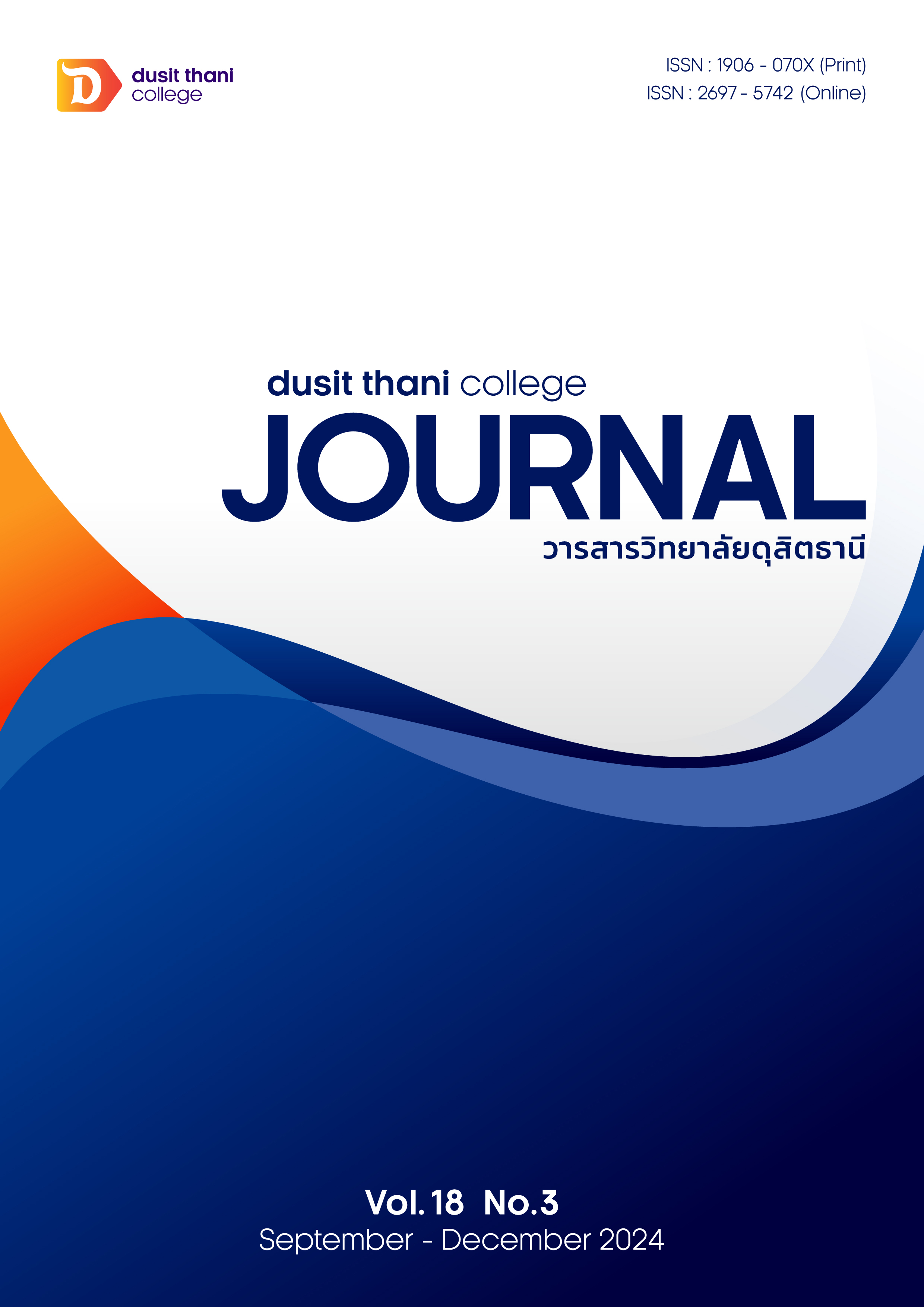เปิดศักยภาพเมืองสงขลา: ศูนย์กลางการท่องเที่ยวเชิงกีฬาและนันทนาการของภาคใต้
Main Article Content
บทคัดย่อ
การวิจัยครั้งนี้มีวัตถุประสงค์เพื่อศึกษาศักยภาพการท่องเที่ยวเชิงกีฬาและนันทนาการในอำเภอเมืองสงขลา จังหวัดสงขลา เกี่ยวกับศักยภาพ 3 ด้านได้แก่ 1) ด้านการดึงดูดใจ 2) ด้านการรองรับ และ 3) ด้านการบริหารจัดการเป็นวิจัยแบบผสมผสาน (Mixed Method) กลุ่มตัวอย่างคือนักท่องเที่ยวที่เดินทางมาอำเภอเมือง จังหวัดสงขลา จำนวน 384 คน และ ผู้ให้ข้อมูลหลัก ได้แก่ตัวแทนจาก หน่วยงานภาครัฐ ภาคเอกชน และภาควิชาการ จำนวน 25 คน เครื่องมือที่ใช้ในการวิจัย คือแบบสอบถาม วิเคราะห์ข้อมูลด้วยสถิติเชิงพรรณนา คือ ค่าความถี่ ค่าร้อยละ ค่าเฉลี่ย และส่วนเบี่ยงเบนมาตรฐาน และแบบบสัมภาษณ์แบบกึ่งโครงสร้าง วิเคราะห์ข้อมูลด้วยการวิเคราะห์เชิงเนื้อหา
ผลการวิจัย พบว่า ศักยภาพการท่องเที่ยวเชิงกีฬาและนันทนาการในอำเภอเมืองสงขลา จังหวัดสงขลาในภาพรวมอยู่ในระดับ มาก ( x̅ = 4.09) เมื่อพิจารณาเป็นรายด้าน พบว่า ด้านการรองรับการท่องเที่ยว ( x̅ = 4.13) รองลงมา การดึงดูดใจด้านการท่องเที่ยว ( x̅ = 4.10) และ การบริหารจัดการ (x̅ = 4.05) ผลการวิเคราะห์เชิงเนื้อหา พบว่า อำเภอเมืองสงขลา จังหวัดสงขลา มีศักยภาพในการดึงดูดใจ มีแหล่งท่องเที่ยวเชิงกีฬาและกิจกรรมนันทนาการที่มีความหลากหลายตอบสนองต่อความต้องการของนักท่องเที่ยว ศักยภาพในการรองรับนักท่องเที่ยวมีระบบโครงสร้างพื้นฐานและสิ่งอำนวยความสะดวกที่มีความพร้อมในการให้บริการ ระบบสาธารณูปโภคที่เพียงพอในการรองรับ
การท่องเที่ยว และศักยภาพด้านการบริหารจัดการ ความปลอดภัยในแหล่งท่องเที่ยว ความพร้อมเกี่ยวอุปกรณ์ที่เกี่ยวข้องกับกีฬาและนันทนาการ และการบริหารจัดระบบสาธารณูปโภค อยู่ในเกณฑ์ที่มาตรฐาน ด้วยความเป็นเมืองเศรษฐกิจที่สำคัญของภาคใต้ ประเด็นที่ต้องปรับปรุงคือ ด้านการบริหารจัดทรัพยากรมนุษย์ด้วยการเพิ่มจำนวนบุคลากรดูแลรักษาความปลอดภัยด้านการท่องเที่ยวบริเวณชายหาดให้เพียงพอต่อความต้องการของนักท่องเที่ยว อำเภอเมืองสงขลา จังหวัดสงขลามีศักยภาพการท่องเที่ยวเชิงกีฬาและนันทนาการ มีความพร้อมที่จะพัฒนาเป็นเมืองกีฬา (Sport City) ในอนาคตต่อไป
Article Details

อนุญาตภายใต้เงื่อนไข Creative Commons Attribution-NonCommercial-NoDerivatives 4.0 International License.
นโยบายการพิจารณากลั่นกรองบทความ
- บทความวิจัยและบทความวิชาการทุกเรื่องที่จะได้รับการตีพิมพ์ต้องผ่านการพิจารณากลั่นกรองโดยผู้ทรงคุณวุฒิ (Peer Review) ในสาขาที่เกี่ยวข้อง จำนวน 3 ท่าน/บทความ
- บทความ ข้อความ ภาพประกอบและตารางประกอบที่ลงตีพิมพ์ในวารสารเป็นความคิดเห็นส่วนตัวของผู้เขียน กองบรรณาธิการไม่จำเป็นต้องเห็นด้วยเสมอไป และไม่มีส่วนรับผิดชอบใด ๆ ถือเป็นความรับผิดชอบของผู้เขียนแต่เพียงผู้เดียว
- บทความที่จะได้รับการตีพิมพ์จะต้องไม่เคยตีพิมพ์ เผยแพร่ที่ใดมาก่อน และไม่อยู่ระหว่างการพิจารณาของวารสารฉบับอื่น หากตรวจสอบพบว่ามีการตีพิมพ์ซ้ำซ้อน ถือเป็นความรับผิดชอบของผู้เขียนแต่เพียงผู้เดียว
- บทความใดที่ผู้อ่านเห็นว่าได้มีการลอกเลียนหรือแอบอ้างโดยปราศจากการอ้างอิง หรือทำให้เข้าใจผิดว่าเป็นผลงานของผู้เขียน กรุณาแจ้งให้กองบรรณาธิการวารสารทราบจะเป็นพระคุณยิ่ง
เอกสารอ้างอิง
Anucha, S., & Kittichai, P. (2018). Evaluating the role of public spaces in urban recreational tourism: A case study of Pattaya Beach. Journal of Leisure and Tourism Management, 14 (3), 67-81.
Chantana, S. (2022). Tourism potential and development guidelines for tourism in Nakhon Si Thammarat Province. Journal of Humanities and Social Sciences, Phranakhon Rajabhat University, 6(1), 94–106. (In Thai)
Jittangwattana, B. (2015). Recreational and Sport Tourism in Northeast Rural Thailand. Nonthaburi: Fern Khantlong Printing
Khongdit, S., & Rattanapongtara, T. (2015). The image of world heritage tourism in Ayutthaya Historical Park in the eyes of international tourists. Research Promotion Fund, Research and Development Institute , Suvarnabhumi Institute of Technology. (In Thai)
Khunla, N. (2018). Guidelines for the development of sports tourism on Samui Island, Surat Thani Province. Master's thesis, Faculty of Arts and Management Science, Prince of Songkla University, Surat Thani. (In Thai)
Kireepetch, P. (2018). An analysis of the pull factor components influencing Chinese tourists' decision to visit Koh Samui. Master's Thesis in Business Administration, Faculty of Management Sciences, Prince of Songkla University. (In Thai)
Morfoulaki, M., Myrovali, G., Kotoula, K.-M., Karagiorgos, T., & Alexandris, K. (2023). Sport tourism as driving force for destinations sustainability. Sustainability, 15 (3), 2445. https://doi.org/10.3390/su15032445
Panmas, N. (2017). Tourists' Satisfaction and Behavior in Samui Water Sport Tourism. Bangkok University
Phasuk, U., & Yoshida, D. (2020). Push and pull factors influencing elderly Japanese tourists' travel to Thailand. Thonburi University Journal of Humanities and Social Sciences, 14 (1), January-April 2020. (In Thai)
Phumsathan, S. (2016). A manual for sustainable tourism development in national reserved forests. Bangkok: National Research Council of Thailand. (In Thai)
Sawaengsuk, N. (2021). Development of a recreational activity model for community-based tourism in Thonburi area. Panyawattana Journal, 13(2), 129–147.
Srirathu, W. (2008). The potential of ecotourism destinations in Khao Kho District, Phetchabun Province (Master's thesis). Bangkok: Graduate School, Srinakharinwirot University. (In Thai)
Srisawat, P., & Charoenwong, T. (2020). The impact of marathon tourism on local economies: A study of Bangkok Marathon (2015-2020). Journal of Sports Tourism and Economics, 15 (2), 34-52. (In Thai)
Udomthanavong, S. (2018). Motivation and Sport Tourism Success in Phuketthon 2018. Research Abstracts, Thai-Nichi Institute of Technology
Wongchai, P., & Metharom, S. (2020). Exploring the potential of urban recreational tourism in Bangkok: A study of green spaces and public parks (2015-2020). Journal of Urban Tourism and Development, 17 (1), 56-72.


